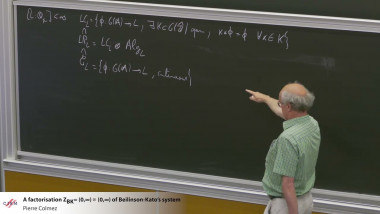
Vanishing of twisted L-functions of elliptic curves over function fields
By Matilde Lalin

A factorisation ZBK= (0,∞) ⊗ (0,∞) of Beilinson-Kato's system
By Pierre Colmez
By John Coates
Appears in collection : The Paris-London Number Theory Seminar, Oct. 2019
Let $K=Q(\sqrt{-q})$, where $q$ is a prime $\equiv 7 \mod 8$, and let $h$ be the class number of $K$. One of the important achievements of the great 19-th century German school of number theory was Dirichlet's proof, using the value at $s=0$ of his L-function $L(\chi,s)$ attached to $K$; that $h=R-N$, where $R$is the number of residues and $N$ is the number of nonresidues modulo $q$ in the set $\{1,2,...,(q-1)/2}$. No proof of even the assertion that always $R > N$ which does not involve L-values has ever been found. As we shall explain in more detail in the lecture, a special case of the celebrated conjecture of Birch and Swinnerton-Dyer predicts a precise analogue of Dirichlet's formula for elliptic curves $E$, which are defined over the Hilbert class field $H$ of $K$, and admit complex multiplication by the ring of integers of $K$. Indeed thanks to a theorem of Deuring, the complex L-series $L(E/H,s)$ attached to such an $E$ has ananalytic continuation over the whole complex plane, and, in particular, the conjecture of Birch and Swinnerton-Dyer asserts that $L(E/H,1)\neq 0$ if and only if the group $E(H)$ of $H$-rational points on $E$ is finite. In my lecture, I hope to explain some joint work with Y. Li and Y. Tian whose aim is to prove that the Tate-Safarevich group $TS(E/H) is indeed finite and has order exactly as predicted by the conjecture of Birch and Swinnerton-Dyer. I shall also discuss some numerical illustration of these results. The theoretical argument will all be based on Iwasawa theory.
